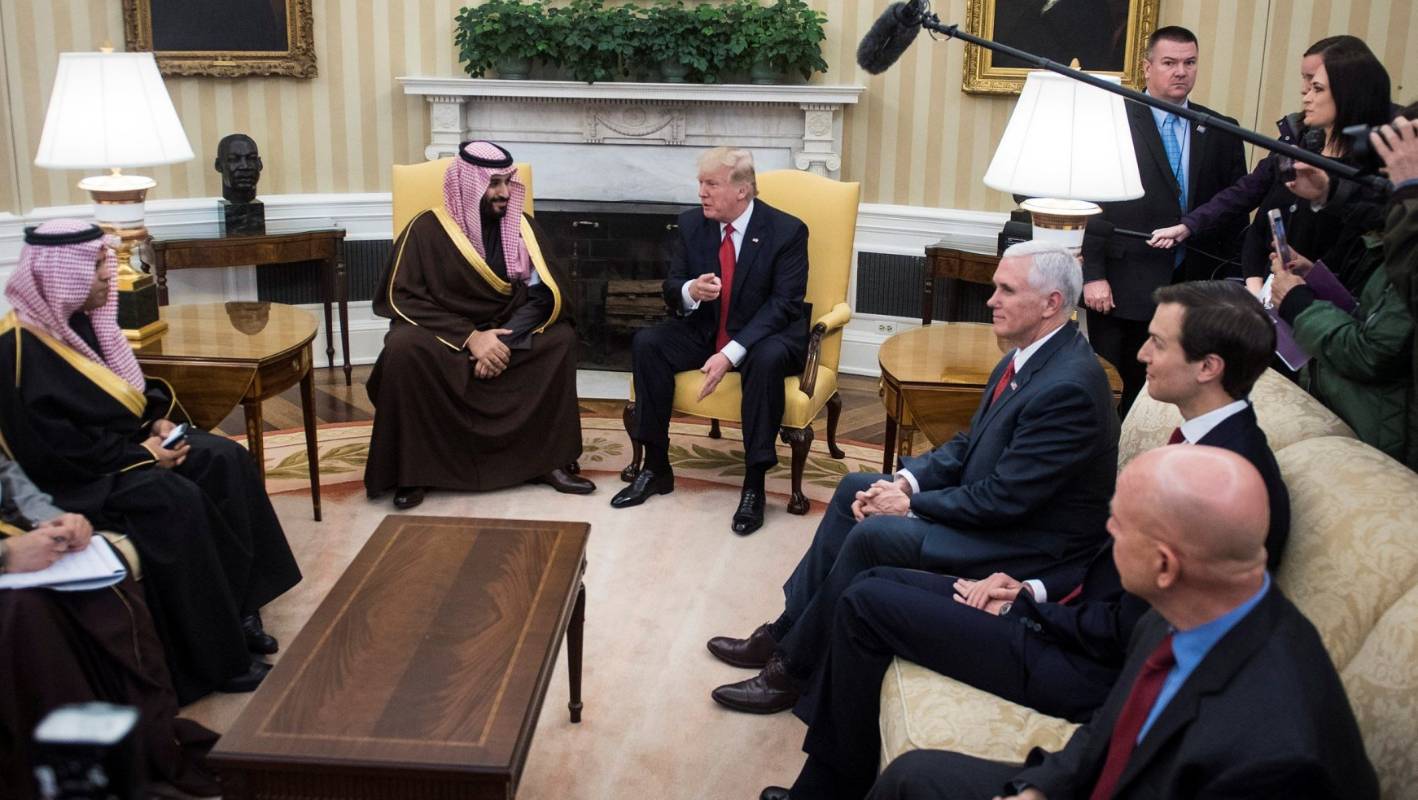Washington Post
Tom Hamburger
Beth Reinhard and
Justin Wm. Moyer

Justin Wm. Moyer October 21 at 10:16 PMIn March 2018, the Saudi ambassador to Washington summoned a cadre of high-priced Washington lobbyists to his embassy to grapple with a delicate, double-pronged challenge.
Crown Prince Mohammed bin Salman was preparing for his first official visit to the United States, just four months after he consolidated power by ordering the detention of members of the royal family and business elite. At the same time, Congress was facing a vote on a bipartisan resolution seeking to end U.S. support for a Saudi bombing campaign in Yemen that has killed tens of thousands of civilians since 2015.
During an afternoon meeting on March 12, Saudi Ambassador Khalid bin Salman sat at the head of a long table in an embassy conference room, flanked by a whiteboard detailing the prince’s itinerary. His assembled advisers included Norm Coleman, the former Minnesota senator; Marc S. Lampkin, a veteran Capitol Hill adviser who served on President Trump’s transition team; and Democratic strategist Alfred E. Mottur, according to people familiar with the gathering.
Eight days after their meeting, the congressional resolution aimed at extracting the United States from what the United Nations labeled “the worst humanitarian crisis in the world” would be defeated — hours after Mohammed was warmly welcomed at the White House at the start of his nationwide tour.
Those twin successes reflected the power of a sophisticated Saudi influence machine that has shaped policy and perceptions in Washington for decades, batting back critiques of the oil-rich kingdom by doling out millions to lobbyists, blue-chip law firms, prominent think tanks and large defense contractors. In 2017, Saudi payments to lobbyists and consultants in Washington more than tripled over the previous year, public filings show.
The strength of the Saudi operation is now being tested amid a global condemnation of the killing of Washington Post contributing columnist Jamal Khashoggi earlier this month in the Saudi consulate in Istanbul — a death the kingdom belatedly acknowledged last week.
Secretary of Defense Jim Mattis, left, welcomes Crown Prince Mohammed bin Salman during an enhanced honor cordon at the Pentagon on March 22. (Alex Wong/Getty Images)
Beyond their spending in Washington, the Saudis have enjoyed a priceless advantage: a warm relationship with the president, who has done business with its wealthy citizens, and his son-in-law, Jared Kushner, who developed a close bond with the crown prince as he crafted the administration’s Middle East policy. The ties build on a long-standing relationship between past administrations and the Saudi royal family.
The kingdom also cultivated opinion leaders through aggressive charm offensives. Powerful government figures — including deputy intelligence chief Maj. Gen. Ahmed al-Assiri, who was fired for Khashoggi’s killing — have visited Washington to court reporters and think tank analysts.
The Saudi ambassador has hosted intimate dinners in Washington and even occasional galas, such as a lavish event at the Andrew W. Mellon Auditorium honoring this year’s visit of the crown prince. The kingdom’s lobbying team was dispatched to ensure that leading members of congressional foreign relations panels attended, public filings show.
Earlier this year, Saudi officials even offered Super Bowl tickets and chartered flights to the event to media stars such as Jake Tapper of CNN and Bret Baier of Fox News, according to Tapper and a Fox News spokeswoman. (Both said they turned the offers down.) The Saudi Embassy in Washington did not return multiple requests for comment. A handful of lobbyists and think tanks have declared they will turn off the Saudi money spigot. Yet to be determined is whether that marks a tipping point in Washington’s ties to Saudi Arabia or merely a lull before business returns to normal.
“The goodwill the Saudis have enjoyed in Washington, either because of lobbying efforts or their perceived value as an ally, is something to watch in the wake of the Khashoggi incident,” said Sen. Mike Lee, a Utah Republican who says Congress has abdicated constitutional responsibilities by supporting the battle in Yemen without declaring war.
Coleman — a dean of the Saudi lobby in Washington and an influential GOP figure who also co-founded a super PAC aligned with House Speaker Paul D. Ryan (R-Wis.) — said national interests are at stake if the U.S.-Saudi partnership does not endure.
“The relationship with Saudi Arabia is critically important, and its partnership in confronting the Iranian threat is critical for U.S. security, for security in the region, including the security of Israel,” he said.
A surge in lobbying
In the past two years, the Saudis have intensified their efforts to cement the U.S. relationship. The kingdom’s spending on U.S. lobbying and consulting, which had dropped from $14.3?million in 2015 to $7.7?million in 2016, surged to $27.3?million last year, according to public records. More than 200 people have registered as agents on behalf of Saudi interests since 2016, according to lobbying documents posted by the Center for Responsive Politics.
Among those on the payroll have been some of Washington’s top public relations and lobbying shops: the McKeon Group, helmed by Howard P. “Buck” McKeon, the former chairman of the House Armed Services Committee; BGR Group, a firm founded by prominent Republicans Ed Rogers and Haley Barbour; the Glover Park Group, which was launched by Democratic political strategists including Joe Lockhart and Carter Eskew; and the now-defunct Podesta Group, the former firm of Democratic superlobbyist Tony Podesta.
Rogers and Eskew are both contributing opinion writers for The Washington Post. Last week, both of their firms announced they were dropping their representation of Saudi Arabia. The Post had told them they could not continue to write for The Post and lobby for Saudi Arabia, according to spokeswoman Kristine Coratti Kelly.
Separately, Saudi money — and funds from its close ally, the United Arab Emirates — have also flowed into think tanks throughout Washington, including the Center for Strategic and International Studies, the Brookings Institution and the Middle East Institute. All three said last week that they are ending or reconsidering Saudi grants.
“One of the foreign policy truisms force-fed in Washington is that the U.S. and Saudi Arabia have a special, unbreakable relationship,” said Sen. Chris Murphy, a Connecticut Democrat and leading critic of the war in Yemen. “At least everybody who is smart and knows about foreign policy who walks into your office tells you that. But as it turns out, a lot of those people are getting gulf money.”
One of the biggest beneficiaries of Saudi money has been the Middle East Institute, which touts itself as “an unbiased source of information and analysis on this critical region.” The organization is chaired by Richard A. Clarke, who held senior national security positions during the administrations of presidents Ronald Reagan, George H.W. Bush and Bill Clinton.
Between 2016 and 2017, the think tank received between $1.25?million and $4?million in funding from Saudi interests, according to its public disclosures.
In 2016, MEI received $20?million from UAE — which has backed the Saudi government’s claims regarding Khashoggi’s death — to renovate its headquarters.
The institute also has other ties to the kingdom. Michael Petruzzello — who took on the kingdom as a client after the Sept. 11 terrorist attacks and whose communications firm Qorvis MSLGROUP reported $6.3?million in lobbying fees from the Saudis in 2016 and 2017 — was a member of the MEI board until earlier this year, according to a spokesman for the institute. And Jack Moore, director of the Washington office of the North American subsidiary of the Saudi government-owned oil company, is currently on the board.
Petruzzello did not respond to requests for comment. Moore did not respond to a request through the institute.
Scott Zuke, a spokesman for the institute, said that it makes clear to donors that its scholars are independent. “We do not accept any donation from a government, individual, corporation or foundation that seeks to restrict our academic freedom,” he said.
The pro-Saudi lobby in Washington ramped up its efforts after a major setback in fall 2016 — the success of a bill pushed by the Sept. 11 families, known as Justice Against Sponsors of Terrorism Act (JASTA), which allowed them to sue the Saudi government over its alleged support for the terrorist attacks. Of the 19 hijackers involved in the attacks, 15 were Saudi citizens.




